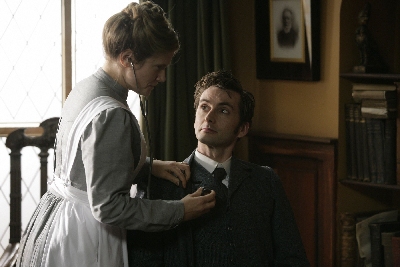Why you can trust GamesRadar+
Written by: Paul Cornell
Directed by: Charles Palmer
Rating:

Two years ago, in “Father’s Day”, Paul Cornell’s first script for the series, there was a moment where a bride and groom talked of meeting waiting for a taxi, when the Doctor admitted, with a hint of regret, that “I could never have a life like that”. This two-parter spins off from that moment, giving us a chance to contemplate how very different the Doctor is from us ordinary mortals.
It’s a story that has been told before, of course. This is an adaptation of Human Nature, Cornell’s Seventh Doctor spin-off novel, published way back in 1995. Always held in high regard by fans, it was voted the best Doctor Who book ever by readers of Doctor Who Magazine. It should come as no surprise, then, that the TV version is a solid-gold classic. Five stars doesn’t really do it justice.
Why is it so good? Because of that simple central premise: “the Doctor becomes human”. Doctor Who fans often talk of the show’s infinite flexibility - it can go anywhere, any time, tell any kind of story. That’s true, but that freedom has always been fenced in by limitations which would seem absurd in any other brand of drama. The Doctor’s emotions has nearly always been off-limits: we never see him truly fall in love, experience grief or utter terror, or have his heart broken (even his romance with Madame du Pompadour, or his affection for Rose aren’t real painful, makes-you-cry-snot-bubbles love). That means there are acres of new ground to be explored, and Cornell runs wild and free in them, creating by far the most emotionally affecting story in the show’s 44 year history. Anyone who managed to resist finding “something in their eye” throughout part two’s succession of poignant codas (cripes, it’s like The Return of the King - but good) must have a heart carved out of cold black jet.
Although we know a lot about the Doctor in terms of dry data (two hearts, respiratory bypass system, member of the Prydonian chapter of Time Lords, yadda yadda yadda), after all these decades we still don’t know much about his interior life. The clever thing about this story is that it tells us a lot about him by throwing him into relief; by showing us what he is not - one of us.
It works incredibly well. The Doctor has made occasional use of the alias "John Smith” since the Patrick Troughton years, but we’ll never think of it in the same way again. Here, John Smith is more than an alias, more than a mere story - he’s a real, three-dimensional person, and one whose simple decency, confusion and Hugh Grant-ish bumbling in the face of romance we grow to love over the course of 90 minutes - so much so that, when we get the Doctor back, it’s a moment of loss and sadness as well as a moment of relief and triumph. David Tennant delineates the two magnificently. If he doesn’t get a BAFTA nomination next year we should organise a f**king picket. While we’re about it, Harry Lloyd’s unblinking Joker of a possessed public schoolboy deserves a nod too.
As well as exploring love and grief, Cornell’s script also deftly touches upon social issues:
the racist attitudes towards Martha (even from a sympathetic character like Joan); the rights and wrongs of training young boys to kill for King and country; the status of women. And it does so with a lightness of touch, without ever becoming preachy or dull. It’s difficult of think of many Doctor Who stories that leave the audience with so much to chew on once the credits roll.
Why can’t Doctor Who always be like this? Well, because you can’t do serious-minded meditations on pacifism and the nature of human existence every week - sadly, one suspects plenty of eight year olds (a vitally important part of Doctor Who’s audience - just as much as the adult viewers who yearn for greater “intellectual depth”) will have been bored rigid by much of this two-parter, despite the addition of those wonderful killer scarecrows to the mix. But mostly because no programme can reach these heights of perfection very often. On the rare occasions when pieces of television like this come along, you just have to savour every moment of them.
Best line: "He's like fire, and ice, and rage. He's like the night and the storm and the heart of the sun. He's ancient and forever. He burns at the centre of time and he can see the turn of the universe. And... he's wonderful."
Ian Berriman
SFX Magazine is the world's number one sci-fi, fantasy, and horror magazine published by Future PLC. Established in 1995, SFX Magazine prides itself on writing for its fans, welcoming geeks, collectors, and aficionados into its readership for over 25 years. Covering films, TV shows, books, comics, games, merch, and more, SFX Magazine is published every month. If you love it, chances are we do too and you'll find it in SFX.



